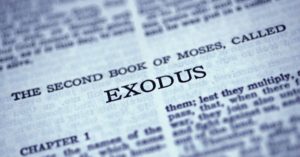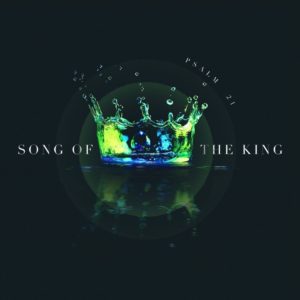Today we finish reading the Book of Genesis. Jacob and Joseph die casting their faith upon the Keeper of the Promises. Israel’s tribe had increased from the original twelve (sons), to the seventy (when they come to settle in Goshen; Gen 46:27, Exodus 1:5), to the multitudes that will return to the Promised Land when they become a nation. (We have already seen the parallel with Jesus calling the Twelve (Matthew 10:1) and the Seventy (Luke 10:1,17), suggesting the continuity in the plan of salvation and the privilege of involvement extended to those whom He chooses.)
The God who created the heavens and the earth had you in mind from the beginning:
Psalm 8:3-9 (NASB) 3 When I consider Your heavens, the work of Your fingers, The moon and the stars, which You have ordained; 4 What is man that You take thought of him, And the son of man that You care for him? 5 Yet You have made him a little lower than God, And You crown him with glory and majesty! 6 You make him to rule over the works of Your hands; You have put all things under his feet, 7 All sheep and oxen, and also the beasts of the field, 8 the birds of the heavens and the fish of the sea, whatever passes through the paths of the seas. 9 O LORD, our Lord, how majestic is Your name in all the earth!
We learned that the God-given status of man as His co-regent on earth (Genesis 1 and 2) was ruined by mankind’s disobedience (Genesis 3). Instead of taking his place in the rule of God, he became ruled by sin (Genesis 4:7). The only escape would be through the sin offering. (It is interesting that the Hebrew word found in Genesis 4:7 ‘chattath’ is both the word for ‘sin’ and ‘sin offering’, and can mean both. Which will we submit to? The rule of sin or the rule of the sin offering?)
The good news is that the God who created us promised a Redeemer. He made Himself known to Abraham, Isaac and Jacob, as the God who so loved the world that He would give His only begotten Son, that whoever believes in Him shall not perish, but have eternal life (John 3:16).
Jesus, God’s Son, while never being less than God, emptied Himself of divine prerogatives, and humbled Himself to be born as man, perfectly submitted to the rule of God the Father through the fellowship of the Holy Spirit, to restore mankind’s place in the rule of God. He lived the life that we should have lived- a life of perfect obedience under God’s holy law. He died the death that God’s law said that we should have died. By this, He fulfills the law on our behalf and righteously reconciles the lawbreakers to Himself. This makes it possible that those who repent and believe on Him receive forgiveness and the power of the Holy Spirit to live under His rule.
The Book of Genesis closes with the assurance of forgiveness. After Jacob’s death, Joseph’s brothers are afraid that Joseph will hate them and retaliate because of their previous terrible treatment of him. But Joseph assures them:
“Do not be afraid. For am I in God’s place? You meant evil against me, but God meant it for good in order to bring about this present result, to preserve many people alive.” (Genesis 50:19-20).
Some see this as a rhetorical question, suggesting that Joseph is saying, “Can’t you see that I am where God has put me?” It is also a picture of how we, who have been forgiven and are reconciled to God through faith in Christ, are now standing in God’s place as we offer forgiveness to others.
Indeed, we can see in Joseph’s case that God worked through all his suffering to bring about a marvelous plan of salvation for his brothers and all his father’s household.
The Book of Exodus is definitely a sequel. It begins with a conjunction, ‘Now’, which could also read as ‘and’, as it continues the Genesis narrative. The first chapter of Exodus references Joseph and asks that we remember how he made it possible for Israel to be treated with favor in Egypt.
Exodus 1:8 (NASB) 8 Now a new king arose over Egypt, who did not know Joseph.
The situation changes in Egypt and now Israel will find itself being greatly oppressed.
Genesis is the Book of Beginnings. In it we saw the beginning of creation, the beginning of mankind, and the beginning of marriage and family. We saw the beginning of human society and its wayward path. We also saw the budding of God’s plan of redemption. We saw how God began to prepare a people through whom He would bring forth the Messiah to be the Redeemer and Blesser of all the nations of the earth. God began this work by calling a man, Abraham, and giving him a promised Son, Isaac. From that son comes a family of many sons. In the Book of Exodus that multitude becomes a nation.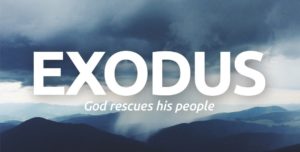
Exodus is the Book of Deliverance. In the Book of Genesis, we have a picture of whom God saves (those who believe His gospel). In the Book of Exodus, we have a picture of how God saves (His plan of redemption through the Mediator, the appointed sacrifice and applied blood of the Passover Lamb, the miraculous provisions for food and guidance and the Tabernacle in the Wilderness).
The key figure in the Book of Exodus at first appears to be Moses. But in the Gospel of Luke we realize that although Exodus describes the historic deliverance of God’s people from the hard taskmasters of Egypt and the angel of death under the leadership of Moses, it foreshadows a greater Exodus by which believers are delivered from death and hell itself, through the greater Moses, the Lord Jesus Christ.
Luke 9:28-31 (NASB)
28 Some eight days after these sayings, He took along Peter and John and James, and went up on the mountain to pray. 29 And while He was praying, the appearance of His face became different, and His clothing became white and gleaming. 30 And behold, two men were talking with Him; and they were Moses and Elijah, 31 who, appearing in glory, were speaking of His ‘departure’ (the Greek word for departure is ‘exodus’) which He was about to accomplish at Jerusalem.
Jesus came to accomplish for us our exodus; our deliverance.
In the New Testament we are assured that what Moses wrote about in this book is written for our benefit (1 Corinthians 10:6, 11) and speaks to us of Christ (1 Corinthians 10:4). The Book of Exodus speaks to us of the cross of Jesus Christ whereby we who believe are delivered from the hard taskmasters of sin and death, the world system and its pharaoh, Satan. It speaks of how we are brought into the glorious liberty of a new beginning by being joined to the Greater Moses in his death, burial and resurrection (figured in the parting of the Red Sea) and becoming a royal priesthood and holy nation led by His Spirit (the pillar of cloud by day and fire by night).
The major sections of Exodus are:
- The Story of a People in Bondage, describing the need for redemption (Chapters 1-6)
- The Story of a People delivered from Bondage, demonstrating the power of the Redeemer (Chapters 7-18)
- The Story of a People becoming a Nation, describing the Provision for the Redeemed, the light of the law and the pattern of the Tabernacle (Chapters 19-40)
A summary verse might be:
“In Your lovingkindness You have led the people whom You have redeemed; In Your strength You have guided them to Your holy habitation.” (Exodus 15:13)
Today we read of the circumstances surrounding the birth of Moses and come to understand how he got his name (Exodus 2:10).
TODAY’S NEW TESTAMENT READING: Matt 16:13-17:9
Jesus gives us much to think about: “Who do YOU say that I am?”
What matters is not our opinion. What matters is what the Father has declared. What matters is what the Holy Spirit has revealed. What matters is whether we have received revelation as to who Jesus of Nazareth really is.
This is not the disciples’ first confession in the New Testament that Jesus is the Son of God (Matthew 14:33). But it is the first time that Jesus reveals that He is building His church with those who are enabled by God to make that confession, having received the revelation from the Father that He is the Christ.
Notice that Jesus uses the Greek word for ‘build’ (‘oikodomeo’) and the Old Testament uses the Hebrew word for ‘build’ (‘banah’) in describing how God constructed the bride for Adam (Genesis 2:22). The church against which the gates of hell cannot prevail is built of that which is of Christ, even as the first woman was built of that which was of Adam. The church of our Lord Jesus Christ is the only existing institution that will last forever.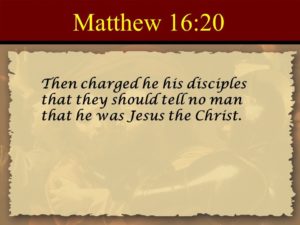
It is important to note that Jesus told his disciples that they should not tell anyone that he was the Christ at this point (Matt 16:20), just as he had told the leper who was cleansed (Matt 8:4) and those who were healed (Matt 12:15) not to announce their healings. The reason is that declaring only Who Jesus is (Lord, Christ, King, Healer, Cleanser) would be an incomplete and inadequate gospel. We need to declare the finished work of redemption (His sinless life that qualifies Him to be our Perfect Savior, His substitutionary death paying our penalty for sin, and His resurrection that vindicates every claim). The gospel is the good news of Who God is AND what God has done in the person of His Son.
From that time Jesus began to show His disciples that He must go to Jerusalem, and suffer many things from the elders and chief priests and scribes, and be killed, and be raised up on the third day. (Matt 16:21)
It is only after Jesus had been crucified as the atoning Lamb of God and raised from the dead on the third day, that He gave the orders to “Go and tell” (Matthew 28:7). It is only after Jesus accomplishes our exodus through His death, burial and resurrection, that we have the gospel. Yes, He is the Christ! But the good news is what He has done and how we can receive its benefits! Through believing on Him we can have forgiveness of sins and eternal life, fellowship with the Father, Son and Holy Spirit and those who belong to Him.
We make the same discovery in the next chapter. After Peter, James and John had seen Jesus transfigured in His glorious state, and Moses and Elijah appearing with Him discussing the finished work of redemption that He would accomplish at Jerusalem (Luke 9:31), Jesus commands them, saying, “Tell the vision to no one until the Son of Man has risen from the dead.” (Matthew 17:9)
It is humbling to see how a person like Peter could be a spokesperson for the Father one moment and for Satan the next (Matthew 16:22). This is a reminder that we would do well to be quick to hear (the right voice) and slow to speak (James 1:19).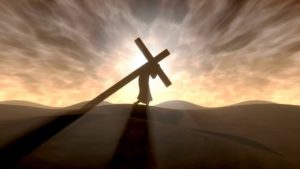
The call to discipleship is for all those who have a revelation of Who Jesus is. Following Jesus is costly. But our expenditure cannot compare to the rewards that He freely gives!
Matthew 16:24-27 (NASB)
24 Then Jesus said to His disciples, “If anyone wishes to come after Me, he must deny himself, and take up his cross and follow Me. 25 “For whoever wishes to save his life will lose it; but whoever loses his life for My sake will find it. 26 “For what will it profit a man if he gains the whole world and forfeits his soul? Or what will a man give in exchange for his soul? 27 “For the Son of Man is going to come in the glory of His Father with His angels, and WILL THEN REPAY EVERY MAN ACCORDING TO HIS DEEDS.
This is a joyful psalm of thanksgiving. Do you rejoice and thank the Lord for answered prayer?
The Lord has made us a kingdom of priests, or as the King James version reads, “kings and priests” to God. So, we can read verses 1 through 7 in this Psalm and put ourselves in the place of the king. Instead of the word ‘king’ and ‘he’, substitute the pronoun ‘I’, and substitute the pronoun ‘me’ for ‘him’ and you will personalize this psalm as a prayer of thanksgiving.
Verses 8-12 reminds us that there will come a day when God takes vengeance on unrepentant sinners.
PROVERB FOR TODAY – PROVERBS 5:1-6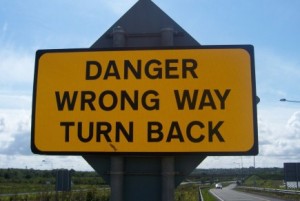
Proverbs 5:1-6 1 My son, be attentive to my wisdom; incline your ear to my understanding, 2 that you may keep discretion, and your lips may guard knowledge. 3 For the lips of a forbidden woman drip honey, and her speech is smoother than oil, 4 but in the end she is bitter as wormwood, sharp as a two-edged sword. 5 Her feet go down to death; her steps follow the path to Sheol; 6 she does not ponder the path of life; her ways wander, and she does not know it.
This Proverb reminds us that we can easily be seduced by people’s words and entertain thoughts that remove us from the path of right living.
PRAYER: Heavenly Father, thank You for your wise counsel. Thank you for sending Your Son and the Holy Spirit to reveal His true identity to us. We are grateful for the reconciliation provided through His cross that enables us to come to You as Spirit-born, royal family. Help us to live lives worthy of our calling, taking up our cross, the revelation of our co-crucifixion, co-burial, co-resurrection and co-ascension as “in Christ ones”! May we not neglect to give You thanks and praise and to publish the good news that the work of redemption is finished, perfectly executed through Your Son, our Lord Jesus Christ! We thank You that we can receive Your gifts of perfect forgiveness and eternal life by putting our full trust in Him and all that He has done on our behalf!
-Pastor David

